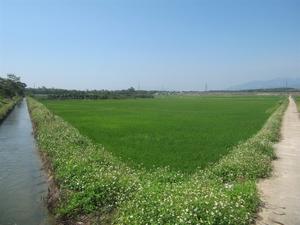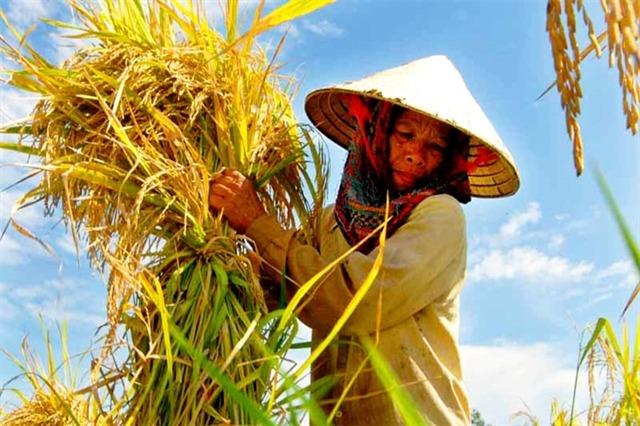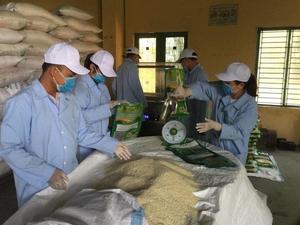 This undated photo shows organic rice fields in Dien Tho commune, Quang Nam province, Vietnam. (PHOTO / VIET NAM NEWS)
This undated photo shows organic rice fields in Dien Tho commune, Quang Nam province, Vietnam. (PHOTO / VIET NAM NEWS)
QUANG NAM - Farmers and businesses in rural communes of the town of Dien Ban, in the central province of Quang Nam, have been working to develop low-yield rice fields as the first ever sustainable source of organic rice in central Vietnam since 2017.
A chemical-free zone has been nurtured using bio-fertilizer and non-chemical plant protection agents in Dien Tho and Dien Hong communes to produce the first safe rice crops over the past three years.
The organic rice zone has been supplying around 200 tonnes to consumers in the central region each year since 2017, earning 50 percent yield increase and doubling the price of normal rice
The organic rice zone has been supplying around 200 tonnes to consumers in the central region each year since 2017, earning 50 percent yield increase and doubling the price of normal rice.
The co-operative model has also created a big change to switch from risky manual, unplanned farming to highly mechanized production. Farmers work under strict timetable supervision and technical management on their fields.
ALSO READ: Farmers reap rewards from grains of wisdom
“It’s a big change. Rice yield was formerly based on fertiliser and the climate,” said Nguyen Thi Ly, 50, a farmer from Dien Tho commune.
“We spent at least VND600,000 (US$26) on fertilizer and plant protection products for every 500 sqm of land, but the crops only sold for VND1.2 million (US$52.2). On top of that we had the risks of rat and insect damage and unfavorable weather, as well as unstable market prices after harvest time,” she said.
 This undated photo shows organic rice fields in Dien Tho commune, Quang Nam province, Vietnam. (PHOTO / VIET NAM NEWS)
This undated photo shows organic rice fields in Dien Tho commune, Quang Nam province, Vietnam. (PHOTO / VIET NAM NEWS)
Ly explained that working odd jobs in the cities for one or two days could earn as much as a whole crop, and that was the reason many farmers had left their farms empty to seek better paid work.
“Rice farming only brings a little profit. It just helps supply families with food, while their main incomes come from other sources and jobs in urban areas and factories.”
Organic farming helps the rice grow stronger with a natural resistance to pests.
a rice farmer in Vietnam
Change
A deal to develop the organic rice farm zone was signed between Dien Ban Agriculture JSC and 150 farmers in Dien Tho commune in 2017.
Businesses have rented land from local farmers and employed them (the farmers) to work in the paddy fields following well-control organic rice production processes.
“We employ farmers for VND5.5 million (US$239) per month – a stable income in rural areas, excluding land rent of US$65 per 500 sqm annually,” said Nguyen Van Kiet, deputy director of the company.
“Meanwhile, businesses cover production costs and market management – two major factors – while farmers make a profitable share in the production chain,” Kiet said.
“It’s difficult for us to persuade farmers to change to mechanised production and non-chemical use,” he explained.
 In this undated photo, a farmer collects rice on a farm in central Vietnam. (PHOTO PROVIDED TO VIET NAM NEWS)
In this undated photo, a farmer collects rice on a farm in central Vietnam. (PHOTO PROVIDED TO VIET NAM NEWS)
Nguyen Thi Phong, a farmer, said her 1 hectare farm could produce seven tonnes of organic rice for a net profit of VND40 million (US$1,700) per year – a 50 percent increase compared to previous production.
“Usually, crop needs six or seven rounds of chemical pesticide and four lots of fertilizer as well as weed-killer. But now only bio-fertilizers and pesticide are used on our farm. Organic farming helps the rice grow stronger with a natural resistance to pests,” Phong explained.
READ MORE: Organic farms fuel sustainable development in Vietnam
“Our organic rice – the Phong Thu brand – was awarded the certificate of the Good Agricultural Practices, VietGAP – in 2018. The product sells for VND25,000 (about US$1.08) per kilo – double the price of normal rice,” Kiet added.
The vice-director explained the organic process helped reduce production and manual labor costs, as well as time.
“Our close control and proven procedures minimise harmful insect infections, while an independent irrigation system kills weeds by maintaining a constant level of water.”
 Workers pack organic rice at a factory in Quang Nam province, Vietnam. (PHOTO / VIET NAM NEWS)
Workers pack organic rice at a factory in Quang Nam province, Vietnam. (PHOTO / VIET NAM NEWS)
Locally born Nguyen Phuoc Thien, the mastermind behind the Phong Thu organic rice brand, said promoting safe food production was a sustainable way for farmers and the community to grow.
“It benefits everyone for two reasons. Consumers are not scared of poisonous chemical agents used in rice production, while farmers earn a better income,” Thirn said.
The company also has a contract with Hoa Thang – a Hazard Analysis and Critical Control Points (HACCP) rice mill – to create the first organic rice production chain in central Vietnam.
Nguyen Minh Hieu, vice-chairman of Dien Ban Town’s authorities, said Phong Thu organic rice product had been recognized as a typical brand of Quang Nam following the ‘One Commune-One Product’ (OCOP) plan – an eco-tourism project launched by the Vietnam National Administration of Tourism.
Hieu said organic farming was a successful way of boosting technological applications in sustainable agricultural production.
Thien, the founder of the Phong Thu brand, said they now planned to export their product to Europe and Southeast Asia.


